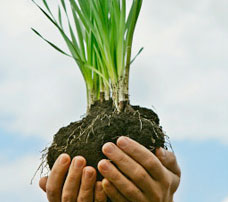Study shows organic agriculture offers healthier plants and more balanced ecosystems

Researchers at Washington State University and the University of Georgia have concluded that balanced ecosystems – such as those found in organic agriculture – are better at controlling pests and growing healthier plants than those found in conventional farm fields.
Their study, the first of its kind, focused on animal and fungal communities and their interactions in potato beds. Sustainable ag research more typically focuses on biological diversity or species richness (the amount of an individual species). But David Crowder, post-doctorate research associate in entyomology at WSU, believes 'species balance' is just as important of a factor for improving conventional farming techniques.
Writing in the journal Nature, Crowder says, "When the species are balanced, at least in our experiments, they're able to fulfill their roles in a more harmonious fashion." The key to ecosystem balance is not allowing one species a chance to dominate another. This may seem like common sense for some, but the dynamic of evenness between insect pests and their natural enemies has never been studied this well.
Science Daily explains the experiment:
“Looking at conventional and organic potato farms in central Washington State's Columbia Basin, Crowder found that the evenness of natural pests differed drastically between the two types of farms. In the conventional fields, one species might account for four out of five insects. In the organic fields, the most abundant species accounted for as little as 38 percent of a field's insect predators and enemies."
Using field enclosures on Washington State University's Pullman campus, Crowder re-created those conditions using potato plants, Colorado potato beetles, four insect species, and three soil pathogens that attack the beetles. When the predators and pathogens had similar numbers, says Crowder, "we would get significantly less potato beetles at the end of the experiment." "In turn," he adds, "we'd get bigger plants."
This study confirms what eco-agriculturalists have been teaching for over four decades. It brings even more awareness to the unsustainable agricultural practices which accommodate the industrialized world's hunger for cheap food.
It is now established that “toxic rescue chemistry” (an element of conventional farming) is, in theory and practice, flawed. Any agricultural system that relies on synthetic pesticides and herbicides to address symptoms of species imbalance throughout soil and insect populations makes for sicker crops and sicker people.




